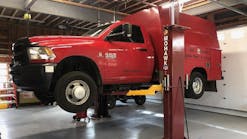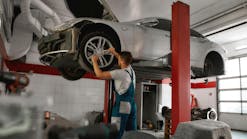Content brought to you by Motor Age. To subscribe, click here.
What you'll learn:
- Why technicians leave the industry
- Why the right leadership is essential for employees who will want to stay with you
- Why leadership is first and foremost about creating a business where the mission is crystal clear
Much has been said and written about the technician shortage — why techs are leaving the automotive industry, how to stop the bleeding, and the best way to retain techs.
The conversation keeps starting up in the middle of the story. By the time a technician has left the industry for good, the story is halfway over, but things began far earlier. Before they quit working in automotive repair, they first had to quit their job working in a shop. They had to feel helpless about reaching the compensation and fulfillment they wanted and deserved in their job, and then seeing that same story playing out everywhere else they looked.
This is why the story of the technician shortage isn’t one of some grand failure needing a miraculous top-down resolution. Believe me, I’ve seen the outlandish solutions proposed by some. If your plan to fix an industry requires creating some ruling committee or governmental oversight, it missed the point entirely.
No, the story of the technician shortage is a failure of leadership. It’s been written tens of thousands of times over, and each time it follows the same beats.
Does your shop have a revolving door for technicians?
I’ve worked with thousands of shops. Over and over, I’ve seen shops fall into two groups:
1. A revolving door of employees, constant technician turnover, and a never-ending struggle to build a team that can reach the next level of sales and production.
2. A culture where we already know the 20-somethings on the team will probably retire with us.
The difference comes down to leadership.
Too often, shop owners and managers have a distorted vision of “leadership” as “bossing,” and it leads to a shop that gravitates to one of two poles:
1. The owner who sees demands and directives as the only way the shop will act right.
2. The owner who views holding employees accountable as being mean to them.
The secret learned by the shop owners with employee retention measured in decades is this: Being a leader is not being a boss. Holding people accountable is not punishing them.
If you don’t hold employees accountable for following policies and procedures, it doesn’t make them love you. It causes them to lose confidence in you and abandon their job and you as a leader. Worse yet, the best employees always leave first. As bad employees operate without accountability, the good ones fill with deeper and deeper resentment until they have no choice but to quit and find an employer who cares about the success of the business and is willing to weed out or redirect that behavior into something constructive.
Nobody wants to sit through one more meeting where ownership is complaining about the one or two people that nobody wants there anyway. Running a democracy doesn’t make employees love you. Letting the team vote to stop working at 3 p.m. each afternoon doesn’t create an environment where top performers excel and thrive.
I can hear the demons screaming and gnashing their teeth as I write this, but top performers who want to give you their all, day-in and day-out, decade after decade, will absolutely recoil from a shop run like this. Employees truly want the following:
- Clear policies
- High expectations
- Clear communication
- Non-negotiable tenets from caring leadership.
Creating a work environment where the good is buried in all of the extra meetings you have to hold to get your team to act right leads to sad, inevitable conclusions. Leadership is not about bossing around a team, treating them like servants helping to achieve your ends.
Great employees want to do the right things for the right reasons
Employees need to see that their work is creating something good, not just helping the owner buy a new racecar or a fancier house with a better pool. They need a purpose and mission that goes far beyond pleasing the manager and his or her mood swings. Great employees want to do the right things for the right reasons.
That’s why leadership is first and foremost about creating a business where the mission is crystal clear. In our shop, our first rule and guiding principle are that we take care of each vehicle as if it belongs to — and each customer as if they are — our favorite relative. It defines every decision we make, every day.
Since my team knows this, they love what they do. They don’t have to lie, fudge, or behave with anything less than righteousness. They know that in our shop, we never cheat, we never shortchange, and we never choose profit over people. They know they’re a part of something good and lasting, and they get to dedicate their hard work to help people in a community they love.
This may seem very elementary (and it is!), but these are blood-sworn oaths that shop owners and their teams must swear to each other. It’s the only way to build the kind of trust that compels employees to stay working for a company for decades.
Creating a lasting, sustainable shop that does not suffer from a revolving door of employees starts and ends living by the management triangle.
It’s a concept I invented, and one I’ve been teaching to my shop and my clients for decades, and it’s simple to consider in every decision we make as leaders.
Consider a triangle with three equal sides. The sides are labeled customer, employee, and shop, and the idea behind couldn’t be easier: Every decision, policy, and procedure must keep all three sides of the triangle in balance.
Decades of operating without this triangle as a guiding principle have led our industry to a point where employees feel underappreciated, underpaid, and unable to find an employer who shares their commitment to doing the right thing.
If you’re reading this with an open heart and open mind, however, you know the truth. You know this industry can be a force for good. You know that it’s filled with hardworking, caring individuals who want to use their gifts and talents to help their neighbors. I hope that the management triangle can serve as a guiding star for your shop.
Know that you’re not alone and that your unbending commitment to keeping the management triangle in balance not only improves the lives of your customers and your employees, and not only makes your shop more successful but is the single most important thing our industry needs.



